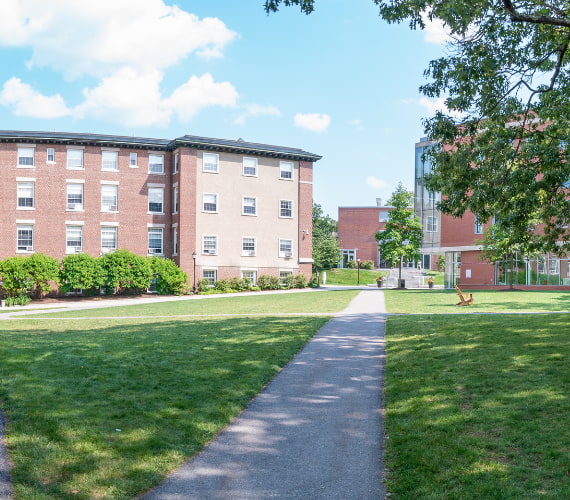The first Regis College President’s Lecture Series on Health of the semester: Building Back Better – The Future of Health Care, focused on federal, state, and city initiatives to integrate the social determinants of health and behavioral health into health care delivery. The event, held on Zoom, was made possible through a partnership with Harvard Pilgrim Health Care, a Point32Health company.
More than 200 people attended the discussion on March 9, which was moderated by Mary Ann Hart, RN, DNP, Regis’ health administration graduate program director. The panel included John E. McDonough, DrPH, MPA, professor of public health practice at Harvard T.H. Chan School of Public Health; State Senator Cindy Friedman (D-Arlington), Massachusetts Senate chair of the Health Care Financing Committee and vice chair on Ways and Means; and Monica Bharel, MD, MPH, senior advisor to the Mayor of Boston, former commissioner of the Massachusetts department of public health.
Dr. John McDonough discussed national health reform including the prospects for President Biden’s Build Back Better Plan. It is no longer likely that Republicans can repeal the Affordable Care Act, which they have tried to do multiple times unsuccessfully in the past decade. The ACA has become more favorable in public opinion, since it has been a success in insuring millions of previously uninsured Americans, and making private health insurance more affordable for millions more. According to McDonough, Medicare for All, a single payer system, is difficult to achieve in the U.S. because historically, it is not in the nature of the American political system to be able to support such a comprehensive reform to our current system. He sees this trend continuing. Negotiations are underway with members of Congress by Democrats promoting strengthening the ability to get affordable private health insurance on the marketplaces, getting states who have not expanded Medicaid coverage to more low-income people to do so, advancing price controls on prescription drugs to make medications more affordable, and adding additional benefits to the Medicare program.
Massachusetts Senator Friedman presented Massachusetts initiatives to improve health care access, cost, quality, and equity. Health care is critical to our economy, is a source of good jobs, and accounts for nearly half of the state’s budget spending. In addition, we continue to excel with healthcare in Massachusetts ranking near the top of all states. The average cost of insurance premiums for a Mass. family of four is about $21,000 annually with average household income for a family of four approximately $80,000 per year. Health care is expensive and we need to pay attention to it. ARPA included nearly $910.1M in healthcare-related spending including funding for behavioral health, hospital relief, public health, and nursing home facilities.
Sen. Friedman reported on how the pandemic has worsened the mental health status of many people and made it more difficult for providers to meet the demands for more treatment. It has put an additional strain on a behavioral health workforce shortage whose providers are also under-paid. Addressing Barriers to Care (ABC) Act 2.0 attempts to address shortfalls with annual mental health wellness exams, enforcing mental health parity laws, addressing emergency department boarding, and more.
The FY2023 budget is underway and will potentially include significant expansion of acute care hospital assessments, funds for a behavioral health roadmap, establishing a Behavioral Health Access and Crisis Intervention Trust Fund, extending MassHealth supplemental drug rebate authority, and expanding Medicare savings plans by increasing income limits. In addition, a new Governors’ Health Care Bill is expected soon.
Sen. Friedman encourages everyone to reach out to your legislators. We must address the workforce of today and tomorrow. Meeting the needs of the workforce means more patients get the health care they need and saves lives in the long run.
Dr. Monica Bharel reported what the City of Boston is doing to better integrate the social determinants of health into health care, when she presented how the Mass and Cass health care crisis in the City of Boston was addressed. It is very important that we do not lose the lessons learned from COVID-19 and the ways we’ve seen that our healthcare system is fractured. The pandemic brought to the fore front unsheltered individuals in Boston. Mayor Wu prioritized addressing the humanitarian crisis at Mass and Cass as soon as she took office. The crisis demanded dealing with the intersecting issues of homelessness, substance abuse, mental health, and adverse health outcomes it produces. In addition, the surrounding community was afraid for its safety. Previous attempts to address the issues failed and Mayor Wu wanted to take a community-first approach with a desire to be data-driven to understand who was living in the tents. A tent survey was administered to lead with a health-equity lens and gather data including demographics, housing history, health care access, substance abuse, and mental health. Health equity must be there from the start, said Bharel. Survey results informed a solution with essential program components available to each individual that would make them successfully go to inside shelter. As a result, three low-threshold transitional housing and shelters were identified and implemented in January. Currently, 175 individuals are staying in the sites and the vast majority of individuals have stayed indoors.
Bharel noted that a barrier was people not wanting these programs in their neighborhoods. She asked the audience to think about our collective responsibility to one another. Another barrier to implementing the new sites was the workforce, including the dire shortage of behavioral health workers and shelter social service outreach.
Since 2007, the Regis President’s Lecture Series on Health has featured insight from industry experts that inform health care professionals, students, and the public about contemporary health and wellness issues. The goal is for audiences to gain the knowledge needed to affect positive change.
This nursing continuing professional development activity was approved by American Nurses Association Massachusetts, an accredited approver by the American Nurses Credentialing Center’s Commission on Accreditation.


